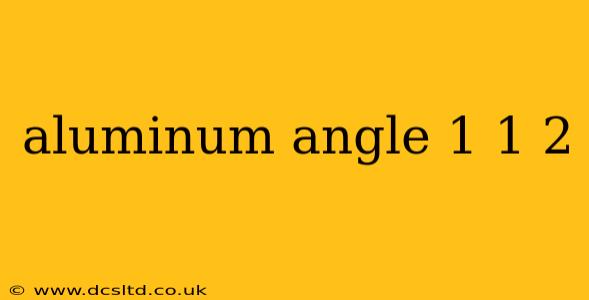Aluminum angle 1 1/2" (meaning 1.5" x 1.5" x 1/8" or another thickness) is a versatile structural component used extensively in various industries. This guide dives deep into its properties, applications, and considerations for selecting the right one for your project. We'll also address common questions surrounding this material.
What are the typical uses of 1 1/2 inch aluminum angle?
Aluminum angle 1 1/2" finds applications across numerous sectors due to its lightweight yet strong nature and corrosion resistance. Common uses include:
- Fabrication: It serves as a crucial component in building frames, structures, and enclosures for equipment, machinery, and various products.
- Automotive: Used in car parts, truck bed liners, and other components demanding strength and lightweight properties.
- Construction: Suitable for creating lightweight yet sturdy supports, frames for windows or doors, and other structural elements.
- Machinery: Used in the construction of machine frames, enclosures, and supporting structures.
- DIY Projects: A popular choice for hobbyists and DIY enthusiasts building furniture, shelving, and other structures.
The specific application will often dictate the required thickness and alloy of the aluminum angle.
What are the different types of 1 1/2 inch aluminum angle?
Aluminum angles aren't all created equal. Variations arise from factors like:
- Alloy: Different aluminum alloys offer varying strength, corrosion resistance, and workability. Common alloys include 6061, 6063, and 5052, each possessing unique characteristics. 6061, for example, is known for its strength, while 6063 is more readily extruded.
- Thickness: Thickness significantly impacts strength and weight. A thicker angle will naturally be stronger but heavier. Common thicknesses range from 1/8" to 1/4" or even thicker depending on the application.
- Finish: Aluminum angles can have various finishes, including mill finish (natural), anodized (for corrosion resistance and aesthetic appeal), or powder-coated (for durability and color).
Understanding these variations is essential for choosing the right angle for your specific needs.
What is the difference between aluminum angle and other metals?
Compared to steel, aluminum angle is significantly lighter but generally less strong. However, its superior corrosion resistance makes it ideal for outdoor applications or environments with high humidity. Other metals like stainless steel offer even better corrosion resistance but at a higher cost and weight. The choice depends on the project's specific requirements, balancing strength, weight, cost, and corrosion resistance.
How strong is 1 1/2 inch aluminum angle?
The strength of 1 1/2" aluminum angle is highly dependent on the alloy and thickness. Thicker angles and stronger alloys naturally provide greater strength. To determine the precise strength for a specific angle, consult the manufacturer's data sheet, which will list properties like yield strength and tensile strength. These values provide a quantitative measure of the angle's ability to withstand stress before yielding or breaking.
Where can I buy 1 1/2 inch aluminum angle?
Aluminum angle 1 1/2" is readily available from various suppliers, including:
- Online retailers: Numerous online retailers offer aluminum angles in various sizes and alloys.
- Metal suppliers: Local metal suppliers and distributors often stock a wide selection of aluminum angles.
- Hardware stores: Some larger hardware stores might carry smaller quantities of common sizes.
Remember to specify the required alloy, thickness, and finish when ordering.
What is the weight of 1 1/2 inch aluminum angle?
The weight of a 1 1/2" aluminum angle varies significantly based on its length and thickness. Consult the manufacturer's specifications or use online calculators that provide weight estimates based on the dimensions and alloy of the aluminum angle. The weight per unit length is typically provided in pounds per foot or kilograms per meter.
This guide provides a comprehensive overview of aluminum angle 1 1/2". Remember to always consult the manufacturer’s specifications for precise details regarding strength, weight, and other properties relevant to your specific application. Choosing the correct angle ensures the success and longevity of your project.
